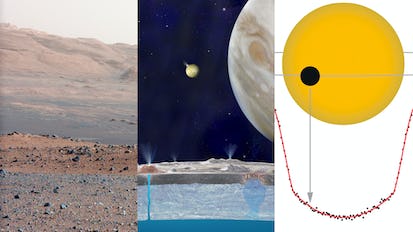- Level Foundation
- Duration 30 hours
- Course by Caltech
-
Offered by

About
Learn about the science behind the current exploration of the solar system in this free class. Use principles from physics, chemistry, biology, and geology to understand the latest from Mars, comprehend the outer solar system, ponder planets outside our solar system, and search for habitability in our neighborhood and beyond. This course is generally taught at an advanced level assuming a prior knowledge of undergraduate math and physics, but the majority of the concepts and lectures can be understood without these prerequisites. The quizzes and final exam are designed to make you think critically about the material you have learned rather than to simply make you memorize facts. The class is expected to be challenging but rewarding.Modules
Unit 1: Water on Mars (week 1)
1
Assignment
- Quiz 1
3
Discussions
- Welcome! Please introduce yourself.
- What's in the sky right now?
- Groundwater sapping or not?
11
Videos
- Introduction to Science of the Solar System
- Lecture 1.01: Early views of Mars
- Lecture 1.02: Mars has canals!
- Lecture 1.03: Taking the temperature of Mars
- Lecture 1.04: Mars DOES have water (in the atmosphere)!
- Lecture 1.05: Heating and composition of the polar caps
- Lecture 1.06: Let's fly to Mars
- Lecture 1.07: The first missions to Mars
- Lecture 1.08: Water on earth
- Lecture 1.09: Mariner 9 -- Mars had FLOWING water!
- Lecture 1.10: Viking and the start of modern Martian science
1
Readings
- Note on the next lecture
Unit 1: Water on Mars (week 2)
1
Assignment
- Quiz 2
1
Discussions
- Polar layered terrains?
10
Videos
- Lecture 1.11: Craters and surface ages
- Lecture 1.12: Outflow channels
- Lecture 1.13:Valley Networks
- Lecture 1.14: Climate cycles on Mars
- Lecture 1.15: Was early Mars warmer and wetter?
- Lecture 1.16: Atmospheric escape
- Lecture 1.17 Martian topography
- Lecture 1.18: Gamma ray spectroscopy and subsurface water
- Lecture 1.19: Glaciers on Mars!
- Lecture 1.20 Origin of low latitude ice
Unit 1: Water on Mars (week 3)
1
Assignment
- Quiz 3
1
Discussions
- Where was the water on Mars?
10
Videos
- Lecture 1.21: Evolution of the interior
- Lecture 1.22: Thermal spectroscopy and mineral identification
- Lecture 1.23: Geology from the Opportunity rover
- Lecture 1.24: Geochemistry from the Opportunity rover
- Lecture 1.25: Introduction to guest lecturers
- Lecture 1.26: Mineralogy on Mars, Part 1
- Lecture 1.27: Mineralogy on Mars, Part 2
- Lecture 1.28: Results from the Curiosity Rover, Part 1
- lecture 1.29: Results from the Curiosity Rover, Part 2
- Lecture 1.30: Where was the water on Mars?
1
Readings
- Note on the next lectures
Unit 2: The insides of giant planets (week 1)
1
Assignment
- Quiz 4
1
Discussions
- Transit of Venus!
11
Videos
- Lecture 2.01: Introduction to Jupiter
- Lecture 2.02: Measuring density
- Lecture 2.03: Using density
- Lecture 2.04: Hydrostatic equilibrium
- Lecture 2.05: Hydrogen equation of state
- Lecture 2.06: Heat transport
- Lecture 2.07: Theoretical internal structure
- Lecture 2.08: A core from gravity?
- Lecture 2.09: Magnetic fields
- Lecture 2.10: The upper atmosphere and the Galileo probe
- Lecture 2.11: Picture models
1
Readings
- Note on the next section
Unit 2: The insides of giant planets (week 2)
1
Assignment
- Quiz 5
2
Discussions
- Core collapse vs. disk instability?
- Juno results?
10
Videos
- Lecture 2.12: Planetesimal formation
- Lecture 2.13: Core formation
- Lecture 2.14: Core-collapse vs. Disk instability
- Lecture 2.15: Saturn and the ice giants
- Lecture 2.16: Discovering hot Jupiters
- Lecture 2.17: Densities of hot Jupiters
- Lecture 2.18: Inflating hot Jupiters
- Lecture 2.19: Kepler and the sub-Neptunes
- Lecture 2.20: Exoplanet spectroscopy
- Lecture 2.21: Juno and future exploration
Unit 3: Big questions from small bodies (week 1)
1
Assignment
- Quiz 6
1
Discussions
- Lead-lead dating
12
Videos
- Lecture 3.01: Introduction to the small bodies
- Lecture 3.02: The formation of small bodies
- Lecture 3.03: The formation of terrestrial planets
- Lecture 3.04: The surface density of the solar system
- Lecture 3.05: An ode to comets
- Lecture 3.06: The composition of comets
- Lecture 3.07: Where do comets come from?
- Lecture 3.08: The formation of the Oort cloud
- Lecture 3.09: Meteorites and the beginning of the solar system
- Lecture 3.10: Types of meteorites: Chondrites
- Lecture 3.11: Types of meteorites: Achondrites
- Lecture 3.12: Asteroids and meteorite delivery
Unit 3: Big questions from small bodies (week 2)
1
Assignment
- Quiz 7
1
Discussions
- Lucy!
9
Videos
- Lecture 3.13: Asteroid compositions
- Lecture 3.14 : Pictures of asteroids
- Lecture 3.15: Asteroid hazards
- Lecture 3.16: The Kuiper belt
- Lecture 3.17: Properties of dwarf planets
- Lecture 3.18: Dynamical instabilities
- Lecture 3.19:The Grand Tack
- Lecture 3.20: Planet Nine
- Lecture 3.21: A trip to the Subaru telescope
Unit 4: Life in the solar system (week 1)
1
Assignment
- Quiz 8
1
Discussions
- Life as we do (or don't) know it
10
Videos
- Lecture 4.01: Introduction to life
- Lecture 4.02: Photosynthesis
- Lecture 4.03: Water
- Lecture 4.04: Alternative energy sources
- Lecture 4.05: History of life on Earth
- Lecture 4.06: Mars -- The Viking experiement
- Lecture 4.07: Mars -- Microbial hitchhikers
- Lecture 4.08: Mars -- Methane?
- Lecture 4.09: Mars -- Methane!!
- Lecture 4.10: Mars -- a habitable environment
Unit 4: Life in the solar system and beyond (week 2)
1
Assignment
- Quiz 9
2
Discussions
- Europa Clipper!
- Planets!
11
Videos
- Lecture 4.11: Oceans on Europa
- Lecture 4.12: Energy on Europa
- Lecture 4.13: Exploring Europa
- Lecture 4.14: Enceladus
- Lecture 4.15: Introduction to Titan
- Lecture 4.16: Weird life on Titan
- Lecture 4.17: Habitable zones
- Lecture 4.18: Detecting exo-life
- Lecture 4.19: Looking around M-dwarfs
- Lecture 4.20: A mission to find life in the solar system
- Lecture 4.21: All good things must come to an end
Final Exam
1
Assignment
- Final exam
4
Videos
- Bonus: The formation of the moon
- Bonus: What we used to think about Sedna (before we knew about Planet Nine!)
- Bonus: Seasons on Titan
- Bonus: Why Pluto had to die
1
Readings
- Bonus material
Auto Summary
Explore the fascinating science behind solar system exploration with this advanced yet accessible course from Coursera. Dive into principles of physics, chemistry, biology, and geology to understand Mars, the outer solar system, exoplanets, and habitability. Ideal for those with some background in math and physics, it offers critical-thinking quizzes and a final exam. The 1800-minute course is available through Starter, Professional, and Paid subscriptions, perfect for curious minds in personal development.

Mike Brown


